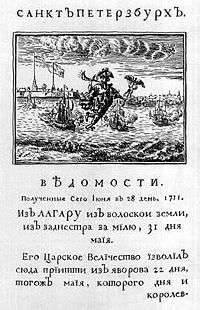Sankt-Peterburgskie Vedomosti

The Vedomosti was the first newspaper printed in Russia. It was established by Peter the Great's ukase dated 16 December 1702. The first issue appeared on 2 January 1703.
Petrine Vedomosti
Following along the lines of the 17th-century handwritten Kuranty, Peter's newspaper contained little other than reports of military victories and diplomatic relations, either composed by the tsar himself or translated from Dutch newspapers according to his choice.
Originally, the newspaper was published at the Print Yard in Kitai-gorod, Moscow. In 1710, engravings were introduced by way of decoration. They usually represented the Peter and Paul Fortress or the Neva River, thus reflecting the growing importance of Saint Petersburg. From 1711, most issues were printed in the Northern capital.
Peter's Vedomosti was published quite irregularly, as important news arrived — sometimes as many as seventy issues appeared annually, sometimes only one. The circulation fluctuated from several dozen copies to four thousand. In 1719, the newspaper contained 22 pages. These early issues of the Vedomosti — of which only a fraction survives — were reprinted in 1855.
Academic Vedomosti
With Peter's death in 1725, the newspaper lost its most precious contributor. As Russia offered no choice of journalists who could carry on his project, ownership of the paper was transferred to the Russian Academy of Sciences, which renamed it Sankt-Peterburgskie Vedomosti (that is, Saint Petersburg News) in 1727.
In the course of the 18th century, the academics issued the newspaper twice a week, supplementing it with extensive scholarly "commentaries", whose editors included Gerhardt Friedrich Müller, Mikhail Lomonosov, and Ippolit Bogdanovich. Since 1800, the Saint Petersburg Vedomosti was published daily.
19th and 20th centuries
Controlled editorially by the liberal journalist Evgeny Korsh since 1863, the Vedomosti was brought to the forefront of the country's political life, as it campaigned for Europeanizing reforms and opposed the conservative stance of the semi-official Moskovskie Vedomosti. Korsh repeatedly clashed with censors over his liberal views until 1875, when he was dismissed from the editorial staff and the paper was taken over by the Imperial Ministry of Education.
After that, the newspaper's circulation and influence declined and it took the Octobrist editorial stance. The Russian Revolution brought about its closure in 1917. It was not until 1991 that the former Communist Party daily Leningradskaya Pravda was rebranded as the revived Sankt-Peterburgskie Vedomosti (in Russian: Санкт-Петербургские ведомости). The first issue of the new Sankt-Peterburgskie Vedomosti was published on 1 September 1991. It is published five times a week with a circulation of 190,000. There is also a business daily, the Vedomosti, introduced in 1999.
Modern newspaper
On December 28th 1995, the newspaper was reorganized by the St. Petersburg Mayor Office as a joint stock company. It belongs to the JSC Sankt-Peterburgskie Vedomosti Editorial House. Vladimir Putin was the first Chairman of the newspapers's Advisory Board until June 1997.
In 2005 the Russia bank, which is a co-founder of the JSC and had previously owned 20% share of the newspaper , acquired blocking share of 35 percent.[1]
References
- ↑ by Anna Pushkarskaya, Kommersant, May 6, 2005 (in Russian).
- Томсинский С. М. Первая печатная газета России, Пермь, 1959.